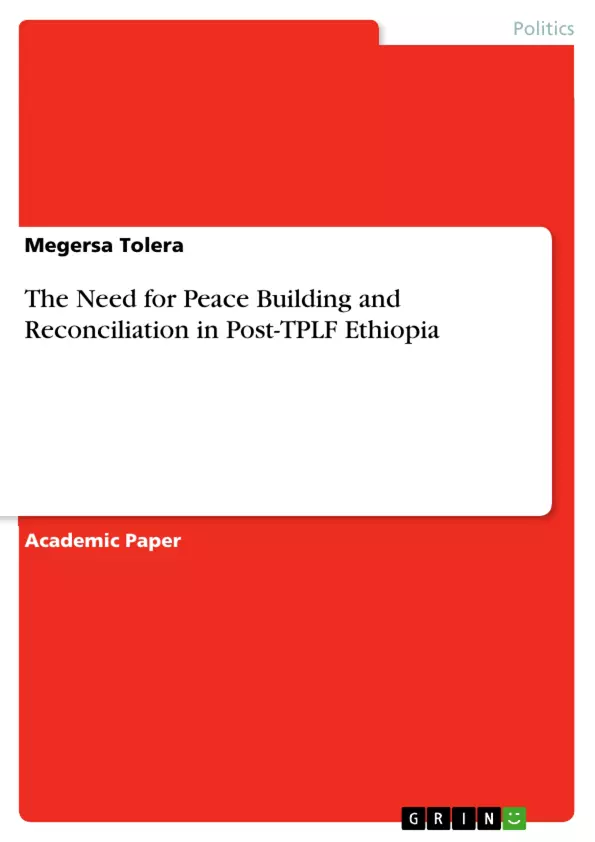This paper attempts to see the need for peace building and reconciliation in post-TPLF Ethiopia. It employed qualitative research approach. It draws heavily on secondary sources, including books, journals, researches and reports of various institutions. The facts collected are analyzed thematically, trans-active approach as alternative explanations. Ethiopia needs a peace-building rule to improve coordination and effectiveness of its interventions in promoting peace and human security. The constitution, sectoral policy pronouncements, international conventions and policy frameworks which the country has ratified, contain bits and pieces of policy pronouncements on peace-building.
In most post-conflict situations, there are major divisions throughout impacted societies, manifested in ethnic, political, economic, social, and religious rifts. The consequent psycho-social impacts that invariably result from protracted civil divergences are often more harmful than the physical damage shaped by the conflicts itself. Conflict is pervasive in every society, so the term post-conflict in this instance indicates the period after a formal dictatorial party in coalition is fired out by long-term protest.
The high-profile reconciliation initiatives with which we are familiar tend to be national-level, top-down approaches: truth commissions, legal processes and reform, national reparation programs, public apologies, etc. These initiatives can only take place once there is a recognized state-wide system of governance with sufficiently broad legitimacy that such initiatives can be carried out under its auspices. In conclusion for reconciliation activities to have any meaning, structural issues leading to conflict must also be addressed. There must be a harmonization of objectives between economic, political and psycho-social interventions. Peace building is increasingly institutionalized across the international landscape.
Inhaltsverzeichnis (Table of Contents)
- 1.1 Introduction
- 1.2. Statement of the problem
- 1.3 Objectives
- 1.4 Methodology.
- 2. Review of related literatures
- 2.1. The concept of Peace building and reconciliation
- 2.2 Peace building and Its Aliases
- 2.3 The Practices of Post conflict Peace building........
- 2.4 Dimensions of Peace building........
- 2.5 The Concept of Reconciliation
- 3. Analysis: The need for Peace building and reconciliation in post- TPLF Ethiopia.......
- Conclusion.......
Zielsetzung und Themenschwerpunkte (Objectives and Key Themes)
This paper examines the need for peace building and reconciliation in post-TPLF Ethiopia. It employs a qualitative research approach, drawing heavily on secondary sources such as books, journals, research reports, and institutional reports. The research analyzes the situation in post-conflict Ethiopia, focusing on the challenges of building peace and achieving reconciliation after a period of political turmoil and societal division.
- The impact of post-conflict divisions on Ethiopian society
- The importance of peace building and reconciliation in post-conflict settings
- Challenges and strategies for promoting peace building and reconciliation in Ethiopia
- The role of institutions and international actors in peace building and reconciliation
- The need for a comprehensive approach to peace building, addressing economic, political, and psycho-social dimensions
Zusammenfassung der Kapitel (Chapter Summaries)
The introductory chapter sets the context for the study, outlining the challenges of post-conflict societies and highlighting the need for peace building and reconciliation. It explores the concept of psycho-social interventions and their importance in addressing the mental health needs of conflict-affected individuals.
Chapter 2 provides an extensive review of relevant literature on peace building and reconciliation. It delves into the concept of peace building and its various aliases, exploring the practices of post-conflict peace building and its different dimensions. The chapter also examines the concept of reconciliation and its multifaceted nature.
Chapter 3 presents an analysis of the need for peace building and reconciliation in post-TPLF Ethiopia. It draws on the theoretical framework established in previous chapters to analyze the specific context of Ethiopia and identify key challenges and opportunities for promoting peace and reconciliation.
Schlüsselwörter (Keywords)
The primary focus of this paper lies on the concepts of peace building, reconciliation, and the specific case of post-TPLF Ethiopia. It investigates the role of peace building and reconciliation in addressing the multifaceted challenges of post-conflict societies, exploring the diverse dimensions of these concepts and analyzing their application in the Ethiopian context.
Frequently Asked Questions
What is the primary focus of this paper on Ethiopia?
The paper examines the urgent need for peace building and reconciliation in Ethiopia following the period of TPLF governance.
What methodology was used for this research?
The study employed a qualitative research approach, analyzing secondary sources such as books, journals, and institutional reports.
What are the major societal divisions in post-conflict Ethiopia?
Divisions are manifested as ethnic, political, economic, social, and religious rifts, often resulting in severe psycho-social impacts.
What reconciliation initiatives are discussed?
The paper discusses national-level approaches like truth commissions, legal reforms, reparation programs, and public apologies.
Why is a harmonization of interventions necessary for peace?
For reconciliation to be meaningful, structural issues must be addressed by harmonizing economic, political, and psycho-social interventions.
- Citar trabajo
- Megersa Tolera (Autor), 2019, The Need for Peace Building and Reconciliation in Post-TPLF Ethiopia, Múnich, GRIN Verlag, https://www.grin.com/document/465518



